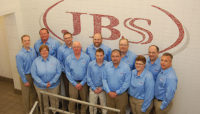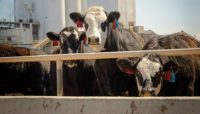Now, six years later, the dust appears to have settled — and a new, strong, global protein processor has emerged, looking to take its perch as a worldwide leader in protein. The transformation of the U.S. businesses it acquired, the reconstruction of a solid, global corporate culture and the continued advancement of its operations beyond status quo, all make JBS The National Provisioner’s 2013 Processor of the Year.
2013 Processor of the Year, JBS USA: Here to stay
JBS USA invested significant capital to upgrade its acquisitions, and today it goes the extra mile to incorporate state-of-the-art, industry-leading processes and strategies, making a statement that it is in the U.S. protein market for the long haul.

Andy Hanacek (left), editor-in-chief of The National Provisioner, tours the Greeley, Colo., beef-processing plant with Rudy Hernandez (center), quality assurance at the plant, and Cameron Bruett, head of sustainability and corporate communications, JBS.

Hanacek discusses the significant capital investments JBS has made in the past six years with Wesley Batista, president and CEO of JBS S.A.'s global operations, at the JBS USA headquarters in Greeley.

Andre Nogueira, president and CEO of JBS USA, explains to Hanacek some of the goals he has for the company since being elevated to his current position in January 2013.

When Brazilian protein processor JBS S.A., began its run of major U.S. protein acquisitions in 2007, many wondered where — or if — the company would stop. Dramatists lamented that the legendary U.S. protein industry was doomed to fall under international, monopolistic ownership someday; some speculated that JBS would simply absorb and chop up Swift & Company, Smithfield Beef and Pilgrim’s Pride and any others it controlled, closing down facilities, selling off parts and moving on, laying a path of destruction in its wake.
JBS’ aforementioned buying binge began in 2007, when it purchased legacy beef and pork processor Swift & Company from private-equity firm HM Capital Partners. It was the Brazilian company’s first foray into the U.S. meat business, and what Wesley Batista, president and CEO of JBS S.A.’s global operations, called “the most remarkable thing” JBS S.A. had done to that point, during an exclusive interview with The National Provisioner at JBS USA’s Greeley, Colo., headquarters in May 2013.
Batista says outsiders viewed the move by JBS as peculiar — that the U.S. market was too mature for JBS to enter at the time. But JBS had been studying the market, and found what it believed was the key to turning Swift’s fortunes around.
“We saw one [protein] company that never lost any money in any bad time, even in the BSE [crisis] — it made money 10 years, every year — some years more; some years less. But Swift was losing money,” Batista explains. The question was, what was the difference, why was one company making money and the other not, when the plants were mostly the same, and the market into which they sold beef was the same as well?
“We figured out it was the people, management,” he adds. “So we [bought Swift] with the intent of strengthening the team, believing that with the right team, we could do a better job of operating the business.”
JBS quickly swooped in to repair a Swift business that had been virtually treading water, lacking proper capital investment in its operations, for the better part of seven years. Meanwhile, it set about simplifying the corporate structure and culture, removing layers of bureaucracy and implementing its values across the entire unified company.
In subsequent acquisitions, JBS stuck to this model and expanded its business across multiple proteins in the U.S., a market JBS feels quite bullish about even today.
“In the next 10 years, I think the U.S. will outperform a lot of markets around the world,” Batista says. “We think the U.S. economy is getting in position to have consistent, good growth, and the American people are a hardworking people who get things done.”
That said, among the main beliefs in JBS’ value system is the call to focus on those things that you can control, Batista says.
“We need to spend greater time looking at things that we control, and less time thinking about things that we don’t control,” he explains. “We have no control over whether the economy will improve or not; but the thing that we have control over is operating our business better than anyone who is in this business.”
Andre Nogueira, who was elevated to president and CEO of JBS USA in January 2013, after stints as CFO of JBS USA and CEO of JBS Australia, points to the bullish view on the U.S. economy as one reason JBS has made so many investments and acquisitions in the U.S. market recently. One of the company’s first moves after acquiring Swift, in fact, set the tone for the next six years.
The Greeley beef-processing plant had been running a single shift, and when Batista stepped in as JBS USA’s first CEO, he quickly sent a message to the company and the industry that JBS wasn’t in this to float through and reap a short-term gain.
“We decided to run this plant double-shift. We hired 1,500 new employees, put them in Greeley, and expanded the output in the plant to 5,000 head per day today,” he says. Soon after, the company also built a trucking operation — JBS Carriers — to handle its product logistics in a cost-effective, efficient manner. These strategic moves have been backed by the fact that, as the large pieces of the company began to fall in line under the JBS values, confidence in the company’s own abilities grew as well.
“We believe that we can produce more and grow our business,” Batista says, “and we have [spent] about $2 billion on capital investments in the last six years to do that.”
Recent investments of note in the Greeley plant include a significant equipment upgrade to the hide-pulling process that had been installed one month prior to The National Provisioner’s tour, as well as expansion of the video-auditing system to the plant’s loin-cutting line, after the system produced good results in improving the quality of work in previous applications.
Nogueira shares the same vision as Batista in terms of the goals of JBS USA moving forward.
“We’ve invested [in our facilities] because we want to have a high-quality product,” Nogueira says. “We [demand] high-quality service; we put a priority on commitment for our customers. So this long-term commitment means, yes, we are prepared to continue to invest as we have in the last six years in the U.S.”
Nogueira reminds everyone that long-term commitment isn’t the sole target for JBS. The company wants to be the best, add the best value for its customers and also get the best return on its investments. Beef continues to expand, Nogueira says, and the opening in April 2013 of a state-of-the-art ground-beef facility at the company’s Tolleson, Ariz., plant offers a glimpse into one of the strategies the beef division is targeting.
“Value-added is something that we’re going to continue pursue more in beef,” Nogueira states. “If you look at the pork business today versus five years ago, five years ago it was a commodity. Today it’s a lot of high-quality product and value-add products. That’s the direction that we’re going in pork.”
Meanwhile, JBS has challenged itself to produce more product with fewer resources — a global initiative for the entire industry.
“The philosophy is pretty simple,” Nogueira says. “We need to produce more with less. So the challenge for this year is, how can we produce more and use less water? How can we produce more and use less energy? And there’s no easy answer to those questions — to produce more with less, that’s a need for the industry.”
Batista believes the 140,000-plus employees of the global company will pull through successfully, as they’ve got the pride and the experience to find a simple, sensible way.
“We don’t believe anything comes easy,” Batista says. “We want all of our team members to be very focused on details, believing that hard work makes things different and changes things for the better… We don’t believe in miracles, you know?”
It took a lot of heavy lifting — and maybe a smaller miracle or two mixed in on a local level — but today, through its words and its actions, JBS is making clear its intentions for the U.S. protein business.
“We want to be here for years and years and years and years — our thinking is not, ‘OK, let’s squeeze everything that we can from this business, make some money and [sell things off],’” Batista states. “We want to be here for a very, very long time.”
Looking for a reprint of this article?
From high-res PDFs to custom plaques, order your copy today!






